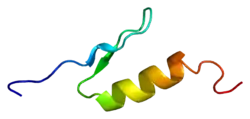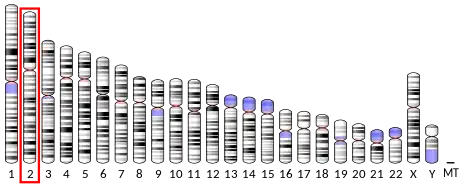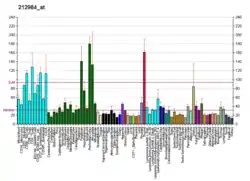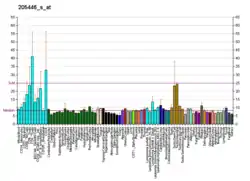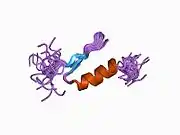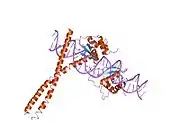Activating transcription factor 2, also known as ATF2, is a protein that, in humans, is encoded by the ATF2 gene.[5]
Function
This gene encodes a transcription factor that is a member of the leucine zipper family of DNA-binding proteins. This protein binds to the cAMP-responsive element (CRE), an octameric palindrome. The protein forms a homodimer or heterodimer with c-Jun. The protein is also a histone acetyltransferase (HAT) that specifically acetylates histones H2B and H4 in vitro; thus, it may represent a class of sequence-specific factors that activate transcription by direct effects on chromatin components. Additional transcript variants have been identified but their biological validity has not been determined.[5]
The gene atf2 is located at human chromosome 2q32.[6] The protein ATF-2 has 505 amino acids. Studies in mice indicate a role for ATF-2 in the development of nervous system and the skeleton.[7] ATF-2 is normally activated in response to signals that converge on stress-activated protein kinases p38 and JNK.[8] ATF-2 phosphorylation in response to treatment of cells with tumor promoter phorbol ester has been demonstrated.[9]
Several studies implicate abnormal activation of ATF-2 in growth and progression of mammalian skin tumors.[10][11] ATF-2 may mediate oncogenesis caused by mutant Ras protein[12] and regulate maintenance of the aggressive cancer phenotype of some types of epithelial cells.
ATF2 has also been shown to be phosphorylated at its C-terminal (serine 472 and 480 in mouse; serine 490 and 498 in human) by ATM upon double-stranded breaks.[13] Mice with mutations of these two serines are sensitive to irradiation and easier to tumorigenesis under p53 knockout background.
Interactions
Activating transcription factor 2 has been shown to interact with
See also
References
- 1 2 3 GRCh38: Ensembl release 89: ENSG00000115966 - Ensembl, May 2017
- 1 2 3 GRCm38: Ensembl release 89: ENSMUSG00000027104 - Ensembl, May 2017
- ↑ "Human PubMed Reference:". National Center for Biotechnology Information, U.S. National Library of Medicine.
- ↑ "Mouse PubMed Reference:". National Center for Biotechnology Information, U.S. National Library of Medicine.
- 1 2 "Entrez Gene: ATF2 activating transcription factor 2".
- ↑ Ozawa K, Sudo T, Soeda E, Yoshida MC, Ishii S (1991). "Assignment of the human CREB2 (CRE-BP1) gene to 2q32". Genomics. 10 (4): 1103–4. doi:10.1016/0888-7543(91)90210-6. PMID 1833307.
- ↑ Reimold AM, Grusby MJ, Kosaras B, Fries JW, Mori R, Maniwa S, Clauss IM, Collins T, Sidman RL, Glimcher MJ, Glimcher LH (1996). "Chondrodysplasia and neurological abnormalities in ATF-2-deficient mice". Nature. 379 (6562): 262–5. Bibcode:1996Natur.379..262R. doi:10.1038/379262a0. PMID 8538792. S2CID 4326412.
- ↑ Gupta S, Campbell D, Dérijard B, Davis RJ (1995). "Transcription factor ATF2 regulation by the JNK signal transduction pathway". Science. 267 (5196): 389–93. Bibcode:1995Sci...267..389G. doi:10.1126/science.7824938. PMID 7824938. S2CID 40268838.
- ↑ Yamasaki T, Takahashi A, Pan J, Yamaguchi N, Yokoyama KK (March 2009). "Phosphorylation of Activation Transcription Factor-2 at Serine 121 by Protein Kinase C Controls c-Jun-mediated Activation of Transcription". J. Biol. Chem. 284 (13): 8567–81. doi:10.1074/jbc.M808719200. PMC 2659215. PMID 19176525.
- ↑ Leslie MC, Bar-Eli M (2005). "Regulation of gene expression in melanoma: new approaches for treatment". J. Cell. Biochem. 94 (1): 25–38. doi:10.1002/jcb.20296. PMID 15523674. S2CID 23515325.
- ↑ Papassava P, Gorgoulis VG, Papaevangeliou D, Vlahopoulos S, van Dam H, Zoumpourlis V (2004). "Overexpression of activating transcription factor-2 is required for tumor growth and progression in mouse skin tumors". Cancer Res. 64 (23): 8573–84. doi:10.1158/0008-5472.CAN-03-0955. PMID 15574764. S2CID 14845890.
- ↑ Vlahopoulos SA, Logotheti S, Mikas D, Giarika A, Gorgoulis V, Zoumpourlis V (17 March 2008). "The role of ATF-2 in oncogenesis". BioEssays. 30 (4): 314–27. doi:10.1002/bies.20734. PMID 18348191. S2CID 678541.
- ↑ Bhoumik A, Takahashi S, Breitweiser W, Shiloh Y, Jones N, Ronai Z (May 2005). "ATM-dependent phosphorylation of ATF2 is required for the DNA damage response". Mol. Cell. 18 (5): 577–87. doi:10.1016/j.molcel.2005.04.015. PMC 2954254. PMID 15916964.
- ↑ Newell CL, Deisseroth AB, Lopez-Berestein G (July 1994). "Interaction of nuclear proteins with an AP-1/CRE-like promoter sequence in the human TNF-alpha gene". J. Leukoc. Biol. 56 (1): 27–35. doi:10.1002/jlb.56.1.27. PMID 8027667. S2CID 85570533.
- ↑ Kara CJ, Liou HC, Ivashkiv LB, Glimcher LH (April 1990). "A cDNA for a human cyclic AMP response element-binding protein which is distinct from CREB and expressed preferentially in brain". Mol. Cell. Biol. 10 (4): 1347–57. doi:10.1128/MCB.10.4.1347. PMC 362236. PMID 2320002.
- ↑ Hai T, Curran T (May 1991). "Cross-family dimerization of transcription factors Fos/Jun and ATF/CREB alters DNA binding specificity". Proc. Natl. Acad. Sci. U.S.A. 88 (9): 3720–4. Bibcode:1991PNAS...88.3720H. doi:10.1073/pnas.88.9.3720. PMC 51524. PMID 1827203.
- 1 2 Yamaguchi Y, Wada T, Suzuki F, Takagi T, Hasegawa J, Handa H (August 1998). "Casein kinase II interacts with the bZIP domains of several transcription factors". Nucleic Acids Res. 26 (16): 3854–61. doi:10.1093/nar/26.16.3854. PMC 147779. PMID 9685505.
- ↑ Sano Y, Tokitou F, Dai P, Maekawa T, Yamamoto T, Ishii S (October 1998). "CBP alleviates the intramolecular inhibition of ATF-2 function". J. Biol. Chem. 273 (44): 29098–105. doi:10.1074/jbc.273.44.29098. PMID 9786917.
- ↑ Murata T, Shinozuka Y, Obata Y, Yokoyama KK (May 2008). "Phosphorylation of two eukaryotic transcription factors, Jun dimerization protein 2 and activation transcription factor 2, in Escherichia coli by Jun N-terminal kinase 1". Anal. Biochem. 376 (1): 115–21. doi:10.1016/j.ab.2008.01.038. PMID 18307971.
- 1 2 Raingeaud J, Gupta S, Rogers JS, Dickens M, Han J, Ulevitch RJ, Davis RJ (March 1995). "Pro-inflammatory cytokines and environmental stress cause p38 mitogen-activated protein kinase activation by dual phosphorylation on tyrosine and threonine". J. Biol. Chem. 270 (13): 7420–6. doi:10.1074/jbc.270.13.7420. PMID 7535770.
- 1 2 Chen Z, Cobb MH (May 2001). "Regulation of stress-responsive mitogen-activated protein (MAP) kinase pathways by TAO2". J. Biol. Chem. 276 (19): 16070–5. doi:10.1074/jbc.M100681200. PMID 11279118.
- 1 2 Tournier C, Whitmarsh AJ, Cavanagh J, Barrett T, Davis RJ (July 1997). "Mitogen-activated protein kinase kinase 7 is an activator of the c-Jun NH2-terminal kinase". Proc. Natl. Acad. Sci. U.S.A. 94 (14): 7337–42. Bibcode:1997PNAS...94.7337T. doi:10.1073/pnas.94.14.7337. PMC 23822. PMID 9207092.
- ↑ Fuchs SY, Xie B, Adler V, Fried VA, Davis RJ, Ronai Z (December 1997). "c-Jun NH2-terminal kinases target the ubiquitination of their associated transcription factors". J. Biol. Chem. 272 (51): 32163–8. doi:10.1074/jbc.272.51.32163. PMID 9405416.
- ↑ Sano Y, Harada J, Tashiro S, Gotoh-Mandeville R, Maekawa T, Ishii S (March 1999). "ATF-2 is a common nuclear target of Smad and TAK1 pathways in transforming growth factor-beta signaling". J. Biol. Chem. 274 (13): 8949–57. doi:10.1074/jbc.274.13.8949. PMID 10085140.
- ↑ Hong S, Choi HM, Park MJ, Kim YH, Choi YH, Kim HH, Choi YH, Cheong J (April 2004). "Activation and interaction of ATF2 with the coactivator ASC-2 are responsive for granulocytic differentiation by retinoic acid". J. Biol. Chem. 279 (17): 16996–7003. doi:10.1074/jbc.M311752200. PMID 14734562.
- ↑ Cho SG, Bhoumik A, Broday L, Ivanov V, Rosenstein B, Ronai Z (December 2001). "TIP49b, a regulator of activating transcription factor 2 response to stress and DNA damage". Mol. Cell. Biol. 21 (24): 8398–413. doi:10.1128/MCB.21.24.8398-8413.2001. PMC 100004. PMID 11713276.
- ↑ Firestein R, Feuerstein N (March 1998). "Association of activating transcription factor 2 (ATF2) with the ubiquitin-conjugating enzyme hUBC9. Implication of the ubiquitin/proteasome pathway in regulation of ATF2 in T cells". J. Biol. Chem. 273 (10): 5892–902. doi:10.1074/jbc.273.10.5892. PMID 9488727.
External links
- Human ATF2 genome location and ATF2 gene details page in the UCSC Genome Browser.
Further reading
- Denys H, Desmet R, Stragier M, Vergison R, Lemahieu SF (1977). "Cystitis emphysematosa". Acta Urol Belg. 45 (4): 327–31. PMID 602896.
- Kim SJ, Wagner S, Liu F, O'Reilly MA, Robbins PD, Green MR (1992). "Retinoblastoma gene product activates expression of the human TGF-beta 2 gene through transcription factor ATF-2". Nature. 358 (6384): 331–4. Bibcode:1992Natur.358..331K. doi:10.1038/358331a0. PMID 1641004. S2CID 9770957.
- Hai T, Curran T (1991). "Cross-family dimerization of transcription factors Fos/Jun and ATF/CREB alters DNA binding specificity". Proc. Natl. Acad. Sci. U.S.A. 88 (9): 3720–4. Bibcode:1991PNAS...88.3720H. doi:10.1073/pnas.88.9.3720. PMC 51524. PMID 1827203.
- Hoeffler JP, Lustbader JW, Chen CY (1991). "Identification of multiple nuclear factors that interact with cyclic adenosine 3',5'-monophosphate response element-binding protein and activating transcription factor-2 by protein-protein interactions". Mol. Endocrinol. 5 (2): 256–66. doi:10.1210/mend-5-2-256. PMID 1828107.
- Ozawa K, Sudo T, Soeda E, Yoshida MC, Ishii S (1991). "Assignment of the human CREB2 (CRE-BP1) gene to 2q32". Genomics. 10 (4): 1103–4. doi:10.1016/0888-7543(91)90210-6. PMID 1833307.
- Diep A, Li C, Klisak I, Mohandas T, Sparkes RS, Gaynor R, Lusis AJ (1991). "Assignment of the gene for cyclic AMP-response element binding protein 2 (CREB2) to human chromosome 2q24.1-q32". Genomics. 11 (4): 1161–3. doi:10.1016/0888-7543(91)90047-I. PMID 1838349.
- Kara CJ, Liou HC, Ivashkiv LB, Glimcher LH (1990). "A cDNA for a human cyclic AMP response element-binding protein which is distinct from CREB and expressed preferentially in brain". Mol. Cell. Biol. 10 (4): 1347–57. doi:10.1128/MCB.10.4.1347. PMC 362236. PMID 2320002.
- Gonzalez GA, Yamamoto KK, Fischer WH, Karr D, Menzel P, Biggs W, Vale WW, Montminy MR (1989). "A cluster of phosphorylation sites on the cyclic AMP-regulated nuclear factor CREB predicted by its sequence". Nature. 337 (6209): 749–52. Bibcode:1989Natur.337..749G. doi:10.1038/337749a0. PMID 2521922. S2CID 4345950.
- Maekawa T, Sakura H, Kanei-Ishii C, Sudo T, Yoshimura T, Fujisawa J, Yoshida M, Ishii S (1989). "Leucine zipper structure of the protein CRE-BP1 binding to the cyclic AMP response element in brain". EMBO J. 8 (7): 2023–8. doi:10.1002/j.1460-2075.1989.tb03610.x. PMC 401081. PMID 2529117.
- Raingeaud J, Gupta S, Rogers JS, Dickens M, Han J, Ulevitch RJ, Davis RJ (1995). "Pro-inflammatory cytokines and environmental stress cause p38 mitogen-activated protein kinase activation by dual phosphorylation on tyrosine and threonine". J. Biol. Chem. 270 (13): 7420–6. doi:10.1074/jbc.270.13.7420. PMID 7535770.
- Livingstone C, Patel G, Jones N (1995). "ATF-2 contains a phosphorylation-dependent transcriptional activation domain". EMBO J. 14 (8): 1785–97. doi:10.1002/j.1460-2075.1995.tb07167.x. PMC 398272. PMID 7737129.
- van Dam H, Wilhelm D, Herr I, Steffen A, Herrlich P, Angel P (1995). "ATF-2 is preferentially activated by stress-activated protein kinases to mediate c-jun induction in response to genotoxic agents". EMBO J. 14 (8): 1798–811. doi:10.1002/j.1460-2075.1995.tb07168.x. PMC 398273. PMID 7737130.
- Zhou Q, Gedrich RW, Engel DA (1995). "Transcriptional repression of the c-fos gene by YY1 is mediated by a direct interaction with ATF/CREB". J. Virol. 69 (7): 4323–30. doi:10.1128/JVI.69.7.4323-4330.1995. PMC 189172. PMID 7769693.
- Newell CL, Deisseroth AB, Lopez-Berestein G (1994). "Interaction of nuclear proteins with an AP-1/CRE-like promoter sequence in the human TNF-alpha gene". J. Leukoc. Biol. 56 (1): 27–35. doi:10.1002/jlb.56.1.27. PMID 8027667. S2CID 85570533.
- Nomura N, Zu YL, Maekawa T, Tabata S, Akiyama T, Ishii S (1993). "Isolation and characterization of a novel member of the gene family encoding the cAMP response element-binding protein CRE-BP1". J. Biol. Chem. 268 (6): 4259–66. doi:10.1016/S0021-9258(18)53604-8. PMID 8440710.
- Martin ML, Lieberman PM, Curran T (1996). "Fos-Jun dimerization promotes interaction of the basic region with TFIIE-34 and TFIIF". Mol. Cell. Biol. 16 (5): 2110–8. doi:10.1128/mcb.16.5.2110. PMC 231198. PMID 8628277.
- Yang L, Lanier ER, Kraig E (1997). "Identification of a novel, spliced variant of CREB that is preferentially expressed in the thymus". J. Immunol. 158 (6): 2522–5. doi:10.4049/jimmunol.158.6.2522. PMID 9058782. S2CID 29299351.
- Shuman JD, Cheong J, Coligan JE (1997). "ATF-2 and C/EBPalpha can form a heterodimeric DNA binding complex in vitro. Functional implications for transcriptional regulation". J. Biol. Chem. 272 (19): 12793–800. doi:10.1074/jbc.272.19.12793. PMID 9139739.
- Fukunaga R, Hunter T (1997). "MNK1, a new MAP kinase-activated protein kinase, isolated by a novel expression screening method for identifying protein kinase substrates". EMBO J. 16 (8): 1921–33. doi:10.1093/emboj/16.8.1921. PMC 1169795. PMID 9155018.
- Kumar S, McDonnell PC, Gum RJ, Hand AT, Lee JC, Young PR (1997). "Novel homologues of CSBP/p38 MAP kinase: activation, substrate specificity and sensitivity to inhibition by pyridinyl imidazoles". Biochem. Biophys. Res. Commun. 235 (3): 533–8. doi:10.1006/bbrc.1997.6849. PMID 9207191.
External links
- PDBe-KB provides an overview of all the structure information available in the PDB for Human Cyclic AMP-dependent transcription factor ATF-2
